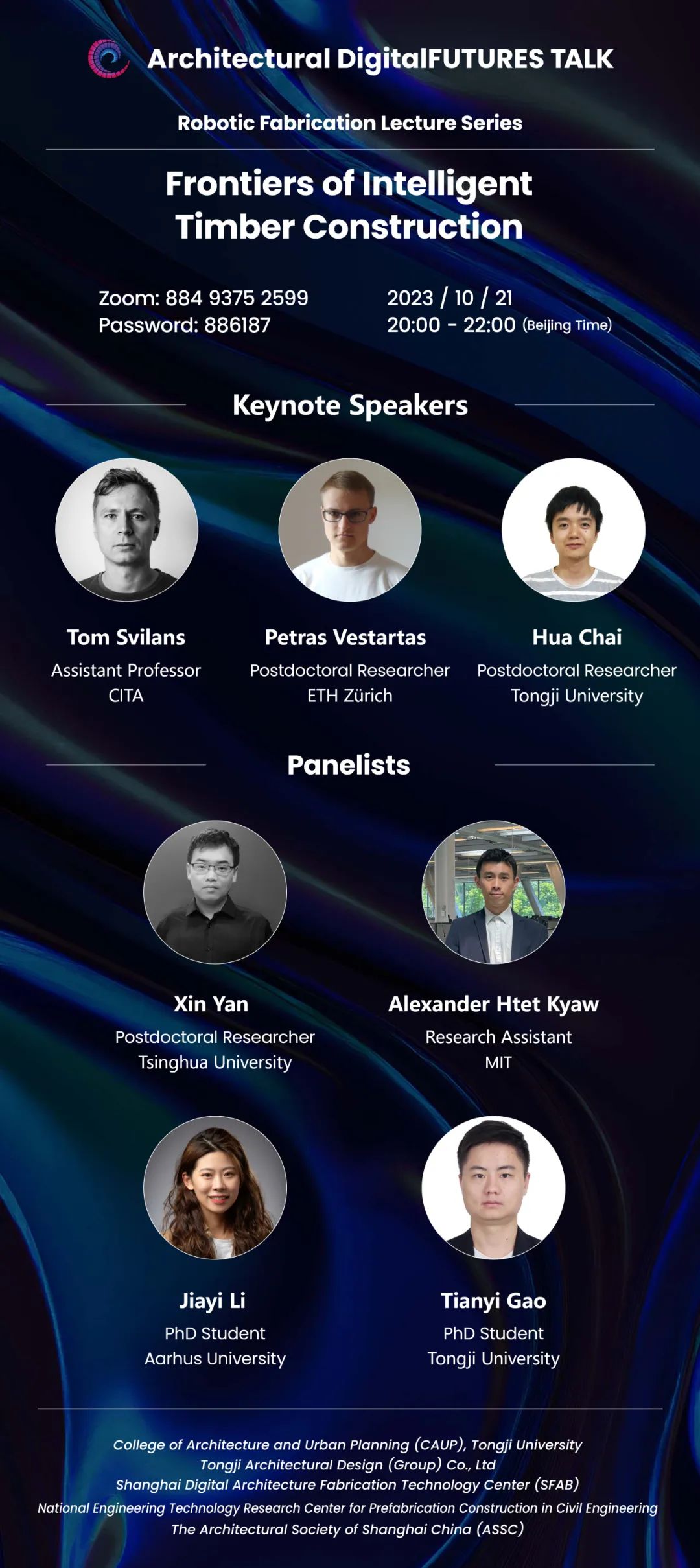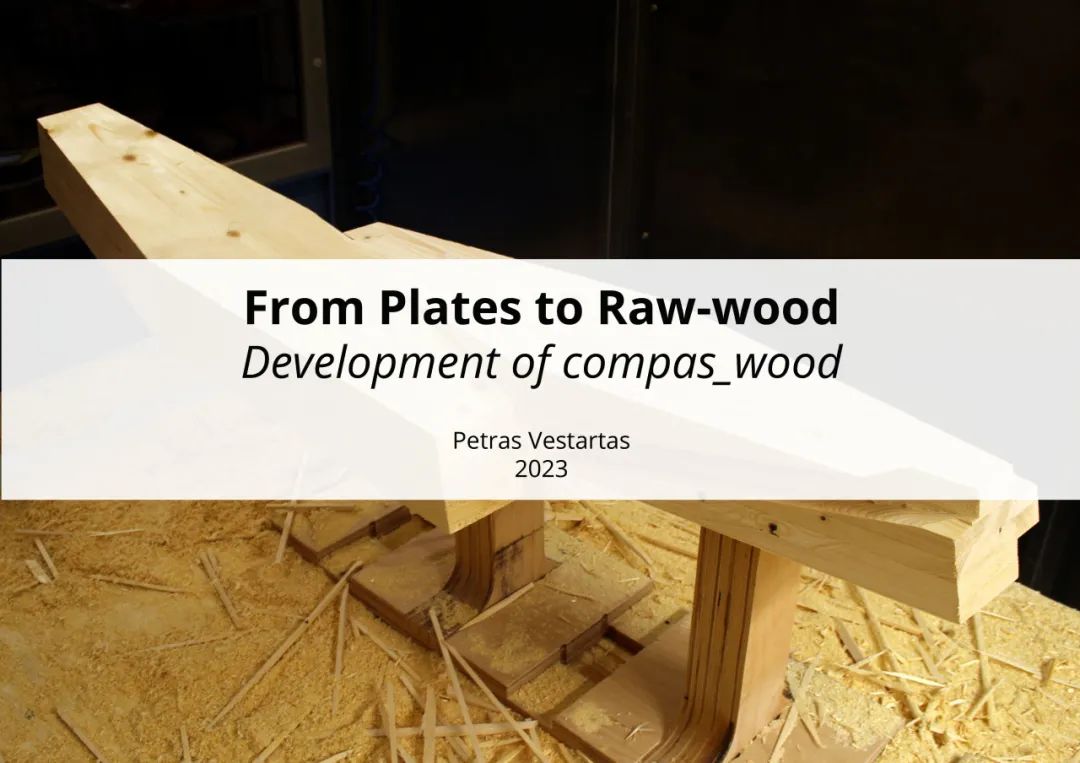
Conference

Event Time
Beijing Time, October 21, 2023, 20:00 - 22:00
Event Link
Zoom Meeting:884 9375 2599
Password:886187
Host of the Event
Tianyi Gao
Event Theme
With the rapid advancement of digital design and robotic construction technology, the design and construction of timber structures are continually exploring the path to intelligence. To delve deeply into the latest research developments and future trends in the field of timber construction, this academic forum has invited three leading scholars from the global domain of related disciplines. They come from different research backgrounds, but each possesses profound research and extensive experience in the intelligent construction of timber structures. The forum aims to discuss the application of intelligent technologies in the design and construction of timber structures and how emerging technologies empower the traditional timber industry, enhancing construction efficiency and accuracy. Additionally, the three scholars will share their latest research findings and practical experiences, providing an in-depth understanding of how intelligent technologies are applied in practical projects.
Presentation Topic
1. From Plates to Raw wood - Development of compas_wood
2. Platform-based Robotic Wood Construction
3. Digital Timber Practice: Design Computation Frameworks for Material Heterogeneity


Tom Svilans
CITA, Royal Danish Academy
Assistant Professor
Tom Svilans is an architectural designer, consultant, and researcher, focusing on digital fabrication, materiality, and computational design modelling. Tom is currently an Assistant Professor at CITA (Centre for IT and Architecture) at the Royal Danish Academy in Copenhagen, Denmark. His research focuses on digital design across the timber value chain – from forestry to construction – and methods of integrating new imaging and information-communication technologies in the design and fabrication of engineered timber elements. As a consultant, he specializes in the computational modelling, design development, and fabrication coordination of complex timber structures.
Tom holds a PhD from the Royal Danish Academy as part of the EU-funded InnoChain research network. He is currently part of the ERC-funded Eco-Metabolistic Architecture (EMA) research project at CITA. He has presented and published his work internationally, and has taught at a number of academic institutions, among them the Bartlett School of Architecture, UCL; the Architectural Association (AA); the Institute for Advanced Architecture of Catalonia (IAAC); and the Royal Danish Academy.
Petras Vestartas
ETH Zürich
Postdoctoral Researcher
Petras Vestartas holds BA and MA degrees in architecture from VAA (Lithuania). His PhD was completed at the Laboratory for Timber Constructions IBOIS, EPFL (Switzerland). Petras Vestartas joined the Block Research Group as post-doctoral researcher in 2023. His research focused on digital timber fabrication, scanning methods, robotic tool-path planning (ABB), development of advanced timber structures and project-based applications. He has developed various software applications, including compas_wood (joinery generation), NGon (polygonal mesh processing), OpenNest (2D nesting), Raccoon (CNC fabrication), and Coockroach (pointcloud processing).
Petras has extensive experience teaching master's and bachelor's students and conducting academic and commercial workshops. He has also supervised Master's thesis projects in architecture and provided guidance to PhD students during his postdoctoral studies. Notably, he designed a new course called Introduction to Computational Architecture (EPFL AR-327) for architects. In addition, Petras has contributed to the setup of CNC and industrial robots for IBOIS researchers. He has also worked as a researcher at CITA, KADK (Denmark) and gained further experience in international architecture offices such as Do-Architects (Lithuania), CEBRA (Denmark), and DMAA (Austria). His work with interdisciplinary teams, including architects, structural engineers, and computer scientists, has enriched his knowledge and skills in the field.
Hua Chai
Tongji University
Postdoctoral Researcher
Hua Chai is a Postdoctoral researcher at the College of Architecture and Urban Planning (CAUP) of Tongji University. His research focuses on computational design and robotic production technologies for innovative timber building systems. He received his Ph.D. from Tongji University in 2022. He visited the Institute for Computational Design and Construction (ICD) at the University of Stuttgart for one year as guest researcher in 2020. He has been awarded Young CAADRIA, and DigitalFUTURES Young. He was also awarded the fellowship of China National Postdoctoral Program for Innovative Talents in 2022. He has also been involved in leading several international workshops including DigitalFUTURES, ACADIA 2020.
Xin Yan
Tsinghua University
Postdoctoral Researcher
Dr. Xin Yan is an architect with comprehensive background of mechanics and computer sciences. He currently is a post-doctoral researcher at the Future Laboratory in Tsinghua University. (He received his Ph.D of architecture and Urban Design and master of architectural and civil engineering from University of Chinese Academy of Sciences (UCAS) at 2022 and 2016 respectively. He graduated from theoretical and applied mechanics at University of Science and Technology of China (USTC) in 2013. In 2019, he also carried out his research work of Structural Topology Optimization at Centre for Innovative Structure and Material (CISM) in RMIT University, Australia.)
His research interests include design-oriented architectural topology optimization, intelligent fabrication, digital humanities & smart city, etc.
Alexander Htet Kyaw
Massachusetts Institute of Technology
Research Assistant
Alexander Htet Kyaw is a researcher with a background in mixed reality, digital fabrication, robotics, biomaterials, deployable structures, digital twins, simulation, machine learning, and computer vision. He is interested in the integration of computation and emerging technology for human-machine-material collaboration in design, visualization, and fabrication. Currently, he is pursuing a graduate degree at MIT in the SMArchS Computation program. He completed his Bachelor of Architecture degree from Cornell University, where he also received a minor in Computer Science and Information Science. He has authored research papers focusing on timber systems in topics such as robotic fabrication for natural logs, mixed reality for bamboo assemblies, and augmented reality for glulam manufacturing.
Kayee Li
Aarhus University
PhD student
Kayee is currently a Ph.D. student at the Department of Civil and Architectural Engineering- Design and Construction, Aarhus University. Her research interests are in digital construction methods for modular timber buildings and the circular design of wood structures. She was involved in the topic of cement-based piezoelectric composites for structural health monitoring at the Beihang University (BUAA), where she received her master's degree in civil engineering. She has completed research projects on digital design of wood structures and topology optimization at the Technical University of Denmark and Keio University in Japan. Before starting her PhD, she worked as a junior structural engineer at Architectural Design and Research Institute of Tsinghua University (THAD), where she was involved in the structural design of several projects.
Tianyi Gao
Tongji University
PhD Student
Gao Tianyi holds a Master's degree in Architecture Design from University College London and is a PhD student at the Shanghai Research Institute for Intelligent Autonomous Systems of Tongji University. He is a committee member of Architectural DigitalFUTURES. His research primarily focuses on the design and fabrication workflow of digital timber construction in the era of mass customization, as well as intelligent robotic technology. He has participated in international conferences such as UIA, CAADRIA, IASS, and CDRF. His related papers have been published in journals including Design for Rethinking Resources, Architectural Intelligence, Frontiers of Architectural Research, World Architecture, Architectural Journal, Time + Architecture, and Contemporary Architecture.
 ABOUT US
ABOUT US




